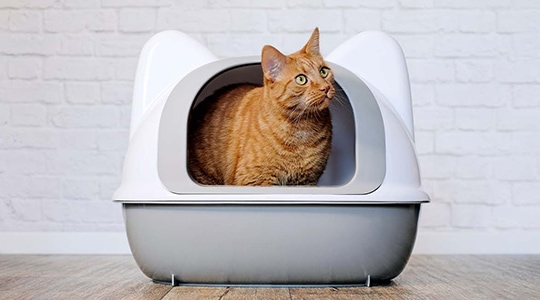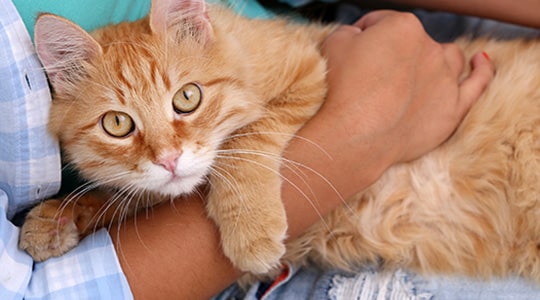
8 Reasons Why Your Cat Won’t Use the Litter Box
Nobody tells you that training a pet isn’t a straight line, do they? When you got your cat, you were probably prepared to help train them to use their litter box in your home. However, you may not have been prepared to deal with a cat that was litter trained and stopped using their litter box. Though they typically use a litter box out of instinct, some cats can need a little refresher on their training. They may even just decide their litter box isn’t up to their standards after years with no issues. After all, cats are going to cat.
So, what do you do when your cat decides to take a stand (or squat) outside of their litter box? Let’s go over some of the top reasons your cat might have stopped using the litter box and how to get them back on track.
#1: Your Kitten May Not Be Ready Yet
If you’re dealing with a kitten that hasn’t quite latched on to the idea of using their litter box yet, they may just need a little more time. Kittens usually aren’t ready for the litter box until they’re at least 4 weeks old. After that, litter box training (opens in new window) may take a bit of time. Your kitten may have the hang of it one day, and then have an accident the next. Just be patient — they’ll get there!
#2: You Don’t Have Enough Litter Boxes
Unlike dogs, cats are not pack animals. They’re very independent and, though they’ll share some things, they appreciate having their own territory. That includes their own space to “do their business.” So, if you have multiple feline friends in your house, a good rule of thumb is to have one litter box per cat (preferably on different sides of the house) plus one additional box, just in case. For example, if you have two cats, your best bet is to have three litter boxes in various places around the house. Keeping them separate gives each cat a place to “go” within their own territory.
#3: The Litter Box Is Too Hard to Reach
Cats like privacy, but if you’re expecting them to travel long distances or weave through an obstacle course, they may decide it’s not worth their time. Try making their litter box a little more convenient to reach, possibly by putting it closer to their favorite area of the house. Just be sure to keep it away from their food and water.

#4: Your Cat May Need a Different Litter Box
While it may not seem important where your cat does their business, finding the right litter box for your feline is a pretty big deal. The right one will match the size of your cat. If you have a kitten, make sure the litter box isn’t too big. If your cat’s an adult, make sure the litter box has plenty of room. Your cat will appreciate having a little space to move around, especially because they’ll want to shuffle some litter over their waste to cover their tracks.
Your cat’s litter box may be the right size, but they still might have objections to the style of box or type of litter you’re using. Cats are picky creatures. It may take some trial and error to find the perfect combination to meet your feline’s preferences. But it’s worth it to keep your house accident free.
#5: More Litter, Please
Your cat will appreciate it if you replace the litter in their box every week. Cats are very particular about hygiene and their scent. Using a clean litter box helps them feel fresh and safe from those invisible predators they’re always looking out for. If they’re not comfortable stepping in used litter — or the litter is too deep or too shallow — they may decide to go elsewhere.
#6: Have You Cleaned the Litter Box Lately?
Replacing the litter is one thing, but once a month you should do your best to clean the entire litter box. Soap (or vinegar) and water should do the trick. Even though cat urine is highly concentrated and may take some effort to clean, avoiding harsh chemicals is best for your cat.
#7: Does Your Cat Seem Stressed or Anxious?
Is there a dog in the house that can’t resist a sniffing tour of the litter box area? Or a younger family member known to make things a little too loud or startling for a peaceful potty session? What about a new family member or roommate? All of these situations can make for a stressed cat. And, when they feel stressed, they may decide to stop using their litter box. Try moving it to a more secluded location and make sure your cat bonds with everyone in the household (including all other four-legged friends!). You can also help decrease their stress by playing with them more often or using tactics like clicker training.
#8: Health Problems
If you’ve tried everything from moving the litter box to deep cleaning it and your cat is still missing the mark regularly, it’s time to make sure there isn’t an underlying health issue. Report your cat’s symptoms to your vet and monitor the situation to make sure things aren’t progressing in a bad way.
If your cat isn’t pooping or peeing at all or “cries” when they’re trying to go, make an appointment with your vet as soon as you can.
It can be frustrating when your cat suddenly has accidents outside their litter box, and it may take some careful inspection to determine the underlying cause. But with time and patience, you and your vet can get your cat’s litter box routine back on track in no time.




